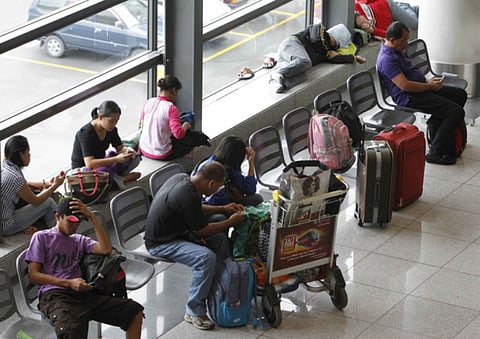Filipino exit clearance: What you need to know
Philippine official denies rumours circulating in social media about the complete suspension of exit clearance

Dubai: Philippine officials in Dubai on Thursday denied rumours circulating in social media that Filipino expatriates can no longer go on vacation or return to their workplace in the UAE or elsewhere abroad because of the “suspension of the issuance of the Overseas Employment Certificate (OEC) or travel exit clearance”.
Labour Attache Felicitas Bay said Filipinos already working in the UAE and other countries who are going on vacation may do so and will have no problems with getting their OEC or OEC exemption through www.bmonline.ph.
What is OEC?
The exit clearance or OEC is a Philippine government requirement for Filipinos going home on holiday. The document proves that they have been hired legally and intend to go back to the same employer abroad.
“We would like to clarify that there is no suspension in the issuance of OEC for workers who would like to take their vacation — or (what we call as) returning workers.
"So long as they have a valid visa, valid passport, and a valid employment contract, they can secure their OEC or OEC exemption (see box) and take their vacation and return to Dubai or UAE,” Bay told Gulf News.
The clarification came following Philippine Labour Secretary Silvestre Bello III’s order to suspend the processing and issuance of exit clearances for all new directly hired overseas Filipino workers (OFWS) on Tuesday “until further orders”.
Social media posts that the “OEC has been removed completely” went viral on Wednesday but this is not true, Bay said.
Bay clarified that “direct hires” are Filipinos who are hired directly in the Philippines by their employers overseas without going through any accredited agency. The ones who will not be given OECs from April 25 are those whose application are still pending in the Philippines and have yet to be deployed abroad.
But this affects roughly just 10 per cent of all OFWs leaving the country, Bay said, without giving exact figures.
As a general rule, Bay said, there is a ban on direct hiring of Filipinos except in some exempted cases (see box).
In an administrative order signed on Tuesday, Bello said the suspension of OEC issuance to new direct hires is “in the interest of justice” and in view of the alleged extortion being committed by some employees of the Philippine Overseas Employment Administration (POEA).
Employees who are not supposed to be directly hired and are not under the exemptions are being fleeced by up to 17,000 pesos each (Dh1,246) to be allowed to leave the country legally.
Q&A on Philippine Overseas Employment Certificate:
Who are affected by the order?
New direct hires as of April 25 or people who are hired directly by their employers abroad without going through an accredited agency in the Philippines. Those whose employment applications are under process and they have yet to be deployed overseas.
Will tourist visa holders in the UAE be affected?
Filipinos who came to the UAE on tourist visas and got employment can still get their OECs through www.bmonline.ph
Is the OEC exemption for existing workers still in place?
Yes, Filipinos returning to the same employer and are already in the POEA database can still be exempted. To know if they can be exempted, visit www.bmonline.ph
Who are affected by the “direct hire ban”?
The Philippine government does not allow or bans “direct hires” except for the following: employees being hired by their close relatives, members of the diplomatic corps, members of a foreign mission, heads of state, international organisations, and other employers as may be allowed by the secretary of labour and employment.
Sign up for the Daily Briefing
Get the latest news and updates straight to your inbox



